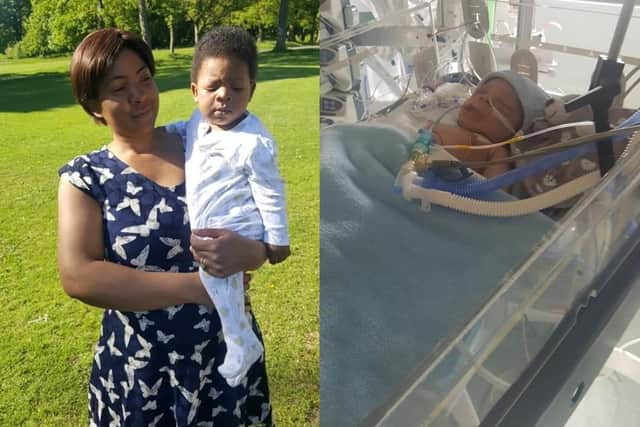Leeds mum raising awareness of Group B strep after newborn baby diagnosed with brain injury
and live on Freeview channel 276
In 2017, at 39-weeks pregnant, Bahatt Ibrahim attended a routine appointment at St James’s Hospital. She had swabs carried out after noticing discharge that morning and her son, Emmanuel Mingeley, was born two days later.
The mother and son returned to hospital nine days after being discharged, as Emmanuel was experiencing breathing problems. He was put in an induced coma for a week while Bahatt received her swab results and found out she was positive for group B Streptococcus (GBS), a common bacterial infection.
Advertisement
Hide AdAdvertisement
Hide AdEmmanuel later had an MRI scan showing he had meningitis and brain damage. He was also diagnosed with cerebral palsy and went on to develop sepsis during his time in the neonatal unit. Although most babies who are exposed to GBS remain well, there is a very small chance of a baby becoming seriously ill or dying, according to the NHS.


Bahatt is now raising awareness of the infection on International Group B Strep Awareness Month. The 39-year-old said: “After I underwent tests at my appointment before Emmanuel’s birth, I assumed there were no issues as I hadn’t heard anything further.
“But when I got Emmanuel home from hospital, he became more and more unsettled. I knew something wasn’t right so we returned to the hospital and that’s when they told me my previous tests confirmed I had Group B Strep.
“It completely floored me, as I had heard how dangerous it could be, and at this point Emmanuel had been put in a coma so I was fearing the worst. Then I was given the devastating news that he had brain damage.
Advertisement
Hide AdAdvertisement
Hide Ad"The whole experience was nothing short of traumatic and to this day I worry about Emmanuel and how life will be for him, particularly now he’s also been diagnosed with cerebral palsy.
"While I know there is nothing I can do to change what’s happened, I have so many questions over whether Emmanuel’s injury could have been prevented. I also want to raise awareness around Group B Strep and how it’s vital for it to be found and treated early.”
In the UK, approximately one in four pregnant women carries GBS. In order to reduce the risks to their baby, women with GBS are offered intravenous antibiotics throughout their labour and during birth.
Medical negligence lawyers at Irwin Mitchell are investigating Bahatt and Emmanuel’s care under Leeds Teaching Hospitals NHS Trust. The Trust said that it had carried out its own investigation into Emmanuel’s case, and it now offers GBS rapid testing to all women in labour.
Advertisement
Hide AdAdvertisement
Hide AdDr Hamish McLure, the Trust’s interim chief medical officer, said: “Our sympathy goes to Emmanuel’s family for the complications they experienced following his birth.
"The hospital alerted the family and supporting healthcare professionals of the mother’s positive test and the family were seen regularly post-delivery. Delayed sudden reactions such as Emmanuel’s are very uncommon.
"We have investigated the circumstances at length and have shared the findings. We now offer Group B Strep rapid testing to all women in labour and if detected offer preventative antibiotics to reduce the risk of complications.”
